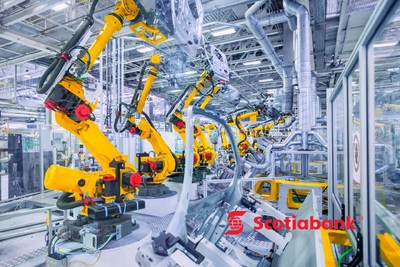TORONTO, Sept. 21, 2017 /CNW/ - The North American Free Trade Agreement (NAFTA) has enabled the North American auto industry to become one of the most competitive in the world, allowing it to boost productivity and gain global market share.

Under the agreement, the auto industry has developed one of the world's most highly integrated supply chains, with three-quarters of US-made auto parts exports sent to its NAFTA partners. The entire North American auto industry has changed and become stronger under NAFTA, enabling it to increase its competitiveness, add to production at home, and gain market share abroad. North America now accounts for roughly 22% of global auto industry exports, up from less than 19% a decade ago.
"NAFTA is a win-win-win for the auto sector, as employment growth in the sector has outpaced overall job creation across North America. Any disruption of the free flow of vehicles and parts would negatively affect economic growth and labour markets," said Carlos Gomes, Senior Economist and Auto Industry Specialist, Scotiabank. "Efforts to modernize NAFTA should ensure that the agreement remains flexible enough for the North American auto sector to maintain its outperformance of recent years."
In the US, NAFTA has enabled the auto industry to outperform other industrial sectors, which has pushed its share of overall US manufacturing activity to new highs. The auto sector now accounts for a record 12.4% of total US manufacturing activity, up from less than an estimated 10% share prior to the introduction of NAFTA.
Auto industry output in Canada is advancing nearly four times faster than the overall growth rate of manufacturing as a whole. Roughly 75% of the value of all auto parts used in North American-built vehicles is sourced within NAFTA, well above the 62.5% threshold required for finished automobiles to move duty-free between NAFTA countries.
Mexican auto production has more than tripled since the mid-1990s and exports of vehicles and parts have surged tenfold such that Mexico now accounts for 6.5% of global auto trade. However, Mexico's NAFTA partners have also benefitted substantially from the agreement. Mexico is now the destination for more than one-third of all auto parts exports from the US, up from less than 5% when NAFTA took effect in 1994. Auto-sector export growth to Mexico from Canada has picked up even more quickly, albeit from a smaller base.
NAFTA has been good for auto-sector jobs in the US and Canada. During the recent expansion, US employment in the industry has increased by more than five times the rate of overall manufacturing employment growth and three times the pace of total economy-wide employment gains. Similarly, auto-sector job creation in Canada has run ahead of manufacturing employment growth and the rate of job creation in the rest of the economy.
Read the full Scotiabank Global Auto Report online at: http://www.scotiabank.com/ca/en/0,,3112,00.html.
Scotiabank provides clients with in-depth research into the factors shaping the outlook for Canada and the global economy, including macroeconomic developments, currency and capital market trends, commodity and industry performance, as well as monetary, fiscal and public policy issues.
About Scotiabank
Scotiabank is Canada's international bank and a leading financial services provider in North America, Latin America, the Caribbean and Central America, and Asia-Pacific. We are dedicated to helping our 24 million customers become better off through a broad range of advice, products and services, including personal and commercial banking, wealth management and private banking, corporate and investment banking, and capital markets. With a team of more than 88,000 employees and assets of over $906 billion (as at July 31, 2017), Scotiabank trades on the Toronto (TSX: BNS) and New York Exchanges (NYSE: BNS). For more information, please visit www.scotiabank.com and follow us on Twitter @ScotiabankViews.

SOURCE Scotiabank


